Exercise 1 - 3
5.0(4)
Card Sorting
1/71
Earn XP
Description and Tags
Last updated 2:10 PM on 5/24/23
Name | Mastery | Learn | Test | Matching | Spaced | Call with Kai |
|---|
No analytics yet
Send a link to your students to track their progress
72 Terms
1
New cards
Converts light to electrical energy
Photodetector
2
New cards
Holds the sample/solution
Cuvette
3
New cards
Selects a specific wavelength of light
Monochromator
4
New cards
Minimizes Stray light
Entrance slit
5
New cards
Gives light toward the sample
Light Source
6
New cards
It controls the width of light beam (band pass) and allows only a fraction of the spectrum to reach the cuvette.
Exit Slit
7
New cards
A high absorbance means _ concentration
High
8
New cards
This helps you to check if your run in the spectrophotometer is reliable
Control solution
9
New cards
This gives you a source of comparison when it comes to computing for the sample concentration
Standard
10
New cards
Distance of tourniquet from venipuncture site
3 to 4 inches
11
New cards
Tourniquet must be applied for no longer than _
1 minute
12
New cards
To anchor the vein, the skin may be pulled \___ from the puncture site
1 - 2 inches
13
New cards
How long should you apply pressure to prevent further bleeding of the venipuncture site?
3 - 5 minutes
14
New cards
Correct angle of the needle when performing venipuncture
15 to 30 degrees
15
New cards
Law applied in spectrophotometry
Beer’s Law
16
New cards
High light transmittance means _ concentration
Low
17
New cards
Most common vein and first choice used in venipuncture
Median Cubital Vein
18
New cards
This is always the first step in specimen collection
Patient Identification
19
New cards
How long should blood be centrifuged to properly extract the serum?
10 minutes
20
New cards
Most commonly used antiseptic in venipuncture (include the concentration)
70% Isopropyl Alcohol
21
New cards
Recommended venipuncture site (vein) for obese patients
Cephalic Vein
22
New cards
This is the topmost part of the micropipette and is used for volume adjustment and to aspirate and dispense the desired amount of liquid into the tip of the micropipette
Plunger
23
New cards
This is similar to serological pipettes but it has no graduation marks at the tip and is usually a self draining one
Mohr pipette
24
New cards
This type of micropipette works on the air displacement principle. It consists of a piston which aspirates and dispenses liquid samples as the air pocket moves up and down.
Air Displacement Pipette
25
New cards
This type of pipette is designed to hold a particular volume but does not dispense the exact volume
To contain
26
New cards
These pipettes have continuous etched ring located near the top of the pipette wherein the last drop should be expelled into the receiving container
Blowout Pipette
27
New cards
A type of pipette designed to dispense the indicated volume
To deliver
28
New cards
This method is commonly used in calibrating pipettes
Gravimetric
29
New cards
The double rings on the upper end of pipette indicate that the pipette is a blow out pipette and should be blown using a
Serological pipette
30
New cards
These pipettes have no markings and the user allows the contents of the pipette to drain by gravity.
Self - Draining Pipette
31
New cards
In these micropipettes, the piston comes in direct contact of the sample
Positive displacement
32
New cards
Is a widely used instrument to accurately and precisely transfer volumes of liquid in the microliter range
Micropipette
33
New cards
This procedure can cause aerosol formation
Pipetting
34
New cards
This technique is used to dispense a measured quantity of liquid by means of air displacement pipette and is mainly used for aqueous solutions
Forward pipetting
35
New cards
This is commonly used for automatic aspiration of serological pipettes.
Gun pipette
36
New cards
A type of pipetting technique that is recommended for viscous or foaming liquids.
Reverse Pipetting
37
New cards
This technique is used for dispensing of reagents into different tubes using 1 pipette tip.
Repeat Pipetting
38
New cards
This technique is used for blood and serum samples.
Heterogenous Pipetting
39
New cards

Identify this type of pipetting technique:
Forward Pipetting
40
New cards
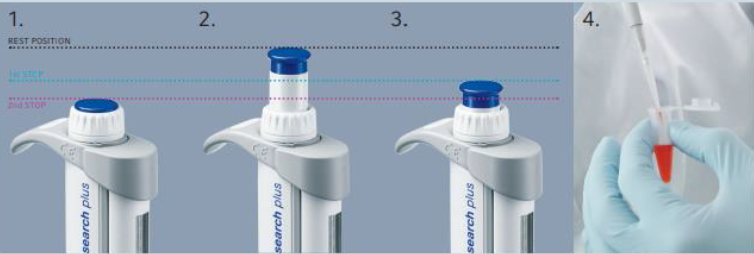
Identify this type of pipetting technique:
Reverse Pipetting
41
New cards
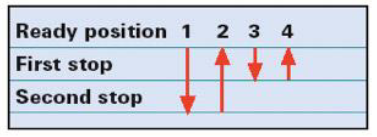
Identify this type of pipetting technique:
Repeat Pipetting
42
New cards
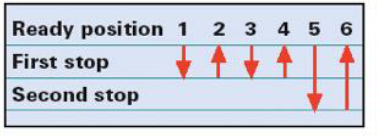
Identify this type of pipetting technique:
Heterogenous Pipetting
43
New cards
If the solution is colorless, it has a ___ meniscus
lower
44
New cards
If the solution is colored, it has an ___ meniscus
upper
45
New cards
This automatic pipette is based on calibration, which uses one volume only
Fixed volume
46
New cards
This automatic pipette is based on calibration, which uses different volume
Variable volume
47
New cards
A type of transfer pipette that is designed to dispense, or transfer aqueous solutions, and always self draining.
Volumetric pipette
48
New cards
A type of transfer pipette that is used on biologic fluids having a viscosity greater than water, and it is a blow out pipette.
Ostwald - Folin pipette
49
New cards
Measurement for micropipette
*KAHIT ANO SA DALAWA. KUNG MALI KA DITO, CONSIDERED PA RIN AS TAMA IF SINAGOT MO IS NANDUN SA DALAWANG MEASUREMENT NA YUN.*
*KAHIT ANO SA DALAWA. KUNG MALI KA DITO, CONSIDERED PA RIN AS TAMA IF SINAGOT MO IS NANDUN SA DALAWANG MEASUREMENT NA YUN.*
50
New cards
Measurement for automatic macropipette
>1mL or >1000uL
51
New cards
Angle of aspirating and dispensing when using the pipette
90 degrees
52
New cards
receptacle angle when aspirating and dispensing
45 degrees
53
New cards
How many times do you have to Pre - wet the pipette?
5 times
54
New cards
Aspiration depth of the tip.
1 - 2mm
55
New cards
What is the depth if the volume range is 0.1 - 1? (answer with unit)
1mm
56
New cards
What is the depth if the volume range is 1 - 100?
2 - 3mm
57
New cards
What is the depth if the volume range is 100 - 1000?
2 - 4mm
58
New cards
What is the depth if the volume range is 1000 - 10000?
3 - 6mm
59
New cards
A CLSI guideline that is for Accuracy in Patient and Sample Identification
GP33-A
60
New cards
Give the 3-way Identification if patient is unresponsive.
(Format: mama mo, papa mo, mama ko)
(Format: mama mo, papa mo, mama ko)
Patient’s verbal ID statement, ID band, visual comparison of the labelled specimen and patient’s ID band
61
New cards
Give 2 patient identifier before processing the specimen.
(Format: hatdog with buns, cheese)
(Format: hatdog with buns, cheese)
Full name, date of birth
62
New cards
Give the parts/components of spectrophotometer (in order)
\[ Format: Buns, Burger Patty, Cheese, Lettuce, Tomato, Onion, Ketchup, Mayo, Bacon - Cheese \]
\[ Format: Buns, Burger Patty, Cheese, Lettuce, Tomato, Onion, Ketchup, Mayo, Bacon - Cheese \]
Light source, Entrance Slit, Monochromator, Exit Slit, Cuvette, Photodetector, Read - Out Device
63
New cards
What is the most commonly used light source in spectrophotometer?
Incandescent Tungsten Lamp
64
New cards
What is the most commonly used photodetector?
Photomultiplier Tube
65
New cards
What is the most commonly used cuvette?
Rectangular sample cell
66
New cards
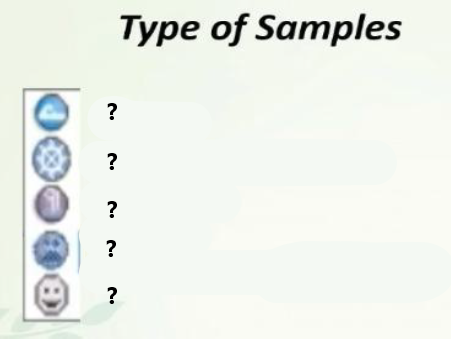
Identify the 1st symbol of spectrophotometer:
Blank
67
New cards
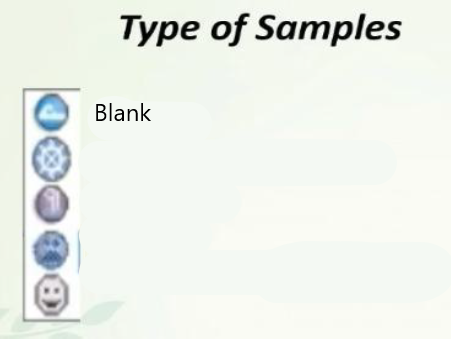
Identify the 2nd symbol of spectrophotometer:
*KAHIT ANO SA DALAWA. KUNG MALI KA DITO, CONSIDERED PA RIN AS TAMA IF SINAGOT MO IS NANDUN SA DALAWA*
*KAHIT ANO SA DALAWA. KUNG MALI KA DITO, CONSIDERED PA RIN AS TAMA IF SINAGOT MO IS NANDUN SA DALAWA*
Calibrator or Standard
68
New cards
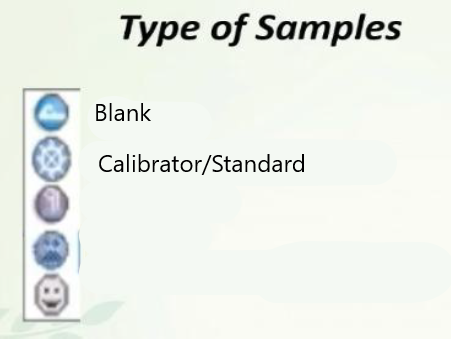
Identify the 3rd symbol of spectrophotometer:
Control
69
New cards
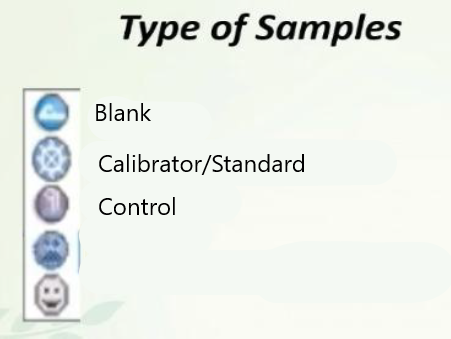
Identify the 4th symbol of spectrophotometer:
STAT
70
New cards
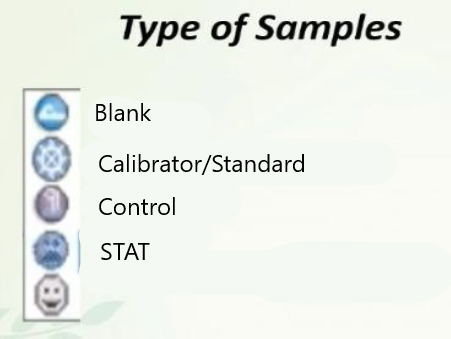
Identify the 5th symbol of spectrophotometer:
*KAHIT ANO SA DALAWA. KUNG MALI KA DITO, CONSIDERED PA RIN AS TAMA IF SINAGOT MO IS NANDUN SA DALAWA.*
*KAHIT ANO SA DALAWA. KUNG MALI KA DITO, CONSIDERED PA RIN AS TAMA IF SINAGOT MO IS NANDUN SA DALAWA.*
Normal or Routine Samples
71
New cards
Relationship of concentration to absorbance.
Directly proportional
72
New cards
Relationship of concentration to transmitted light or transmission.
Inversely proportional